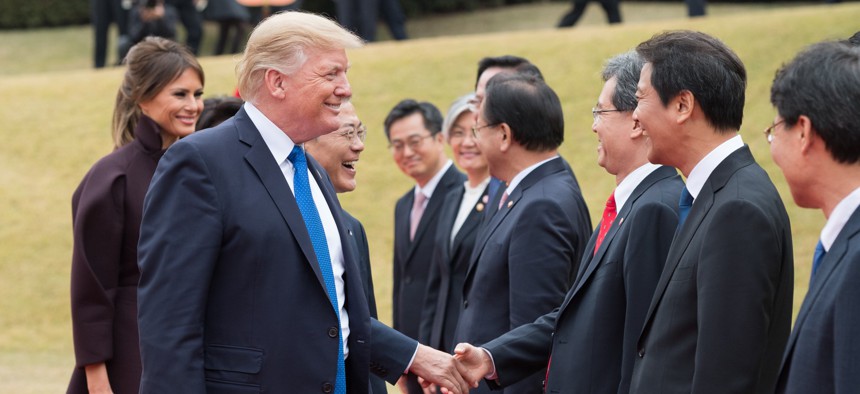
Trump greets South Korean leaders Tuesday. Andrea Hanks/White House
Donald Trump: Unlikely Defender of U.S. Allies
The candidate who said Japan and South Korea made "billions screwing us" is now a president vowing to stand by them.
It’s been a remarkable few days for a man who once accused America’s “so-called allies” Japan and South Korea of “making billions screwing us.” A man who, as recently as last year, argued that “we’re better off” if both countries protected themselves from North Korea—by acquiring their own nuclear weapons if need be—rather than freeloading off U.S. military power. A guy who said, of a potential fight between Japan and North Korea, “Good luck, folks. Enjoy yourself.”
When Donald Trump wrapped up his visit to Japan earlier this week, Orville Schell, a scholar of China and its neighbors since the 1970s, marveled, “In my lifetime, I’ve not seen the U.S.-Japan alliance more highlighted, vital, and well-fortified than now.” And in a speech in Seoul on Wednesday, Trump made a thundering commitment to defend South Korea.
“The Trump administration hasn’t done anything that would weaken” the U.S.-South Korean alliance, Han Sung Joo, a former South Korean foreign minister and ambassador to the United States, told me shortly before Trump’s address. “The behavior of [North Korean leader] Kim Jong Un has only made the alliance stronger and [more] necessary.”
In his remarks to the South Korean legislature, Trump chose not to focus on something that he and other officials in his administration have emphasized in the past: the threat posed to Americans by North Korea’s development of long-range missiles that can carry nuclear warheads to the mainland United States. Instead, he highlighted the danger of North Korea leveraging this capability to “blackmail” America into abandoning its alliance with South Korea—of Kim Jong Un essentially holding U.S. cities hostage with nukes while he pursues North Korea’s dream of subjugating South Korea and reunifying the Korean peninsula.
As Thae Yong Ho, one of the highest-ranking officials ever to defect from North Korea, recently explained to me, North Korean leaders assume that the U.S. government will eventually withdraw American forces and military assets from South Korea rather than risk, say, San Francisco to protect Seoul. I described Thae’s account of what North Korean officials hope would happen next:
If American troops flow out of South Korea, North Korean leaders believe “foreign investment will follow … and then, when the foreign investment starts to leave, South Korean companies may follow, they may move their headquarters to other countries. And if that is the case, then maybe the elite of South Korea may transfer their money to other countries, send their children to America, whatever. The whole system would be destabilized.”
North Korea’s leaders look to America’s 1973 withdrawal from Vietnam and the 1975 reunification of the country as precedent, Thae noted. “When North Vietnamese forces attack … [South Vietnam] collapses very easily,” he said. “That is the same [result] North Korea wants to achieve by nuclear blackmail.”
Trump’s speech was a plea for all countries—and particularly China, the next stop in the president’s Asia trip—to isolate North Korea economically and diplomatically. It was something of a peace offering to Kim Jong Un, at least relative to Trump’s typically combative rhetoric. He vaguely dangled “a path to a much better future” in front of the North Korean leader for a steep price: the North ceasing its aggressive behavior, halting its work on ballistic missiles, and dismantling its nuclear weapons. But his speech was primarily an extended argument for why the United States won’t yield to North Korea’s nuclear blackmail.
“We will not be intimidated,” Trump vowed, citing as evidence the kind of U.S. military support for South Korea—aircraft carriers, fighter jets, nuclear-powered submarines—that he once deplored. The North Korean “regime has interpreted America’s past restraint [in the face of North Korean aggression] as weakness. This would be a fatal miscalculation.”
Trump framed the standoff with North Korea as one not simply between “responsible nations” and a “rogue regime” with nuclear weapons, but between the forces of freedom and tyranny—a characterization that only makes sense in the context of safeguarding South Korea, since North Korea’s mere possession of nuclear weapons, no matter their range, doesn’t imperil the American way of life.
“On this peninsula, we have watched the results of a tragic experiment in a laboratory of history,” Trump noted. “It is a tale of one people, but two Koreas. One Korea in which the people took control of their lives and their country, and chose a future of freedom and justice, of civilization, and incredible achievement. And another Korea in which leaders imprison their people under the banner of tyranny, fascism, and oppression.”
Holding the “thin line of civilization,” as U.S. and South Korean troops did during the Korean War, “is a choice free nations have always had to make,” Trump added. “We have learned together the high cost of weakness and the high stakes of its defense. America’s men and women in uniform have given their lives in the fight against Nazism, imperialism, communism, and terrorism.”
When I asked Han, who is now a Bouton Fellow at the Chicago Council on Global Affairs, how he squared Trump’s many criticisms of South Korea—of the South’s trade practices, contributions to its own defense, and “appeasement” of North Korea, for example—with the president’s robust support for the alliance this week, the former South Korean official said he has learned “not to react to every word that President Trump utters” while also not “ignoring or making light of what he’s saying—take his words seriously but not literally.” Experience suggests that “in the course of time, President Trump will come around to the reality of what seems to be the more reasonable way of dealing with the situation,” Han said.







